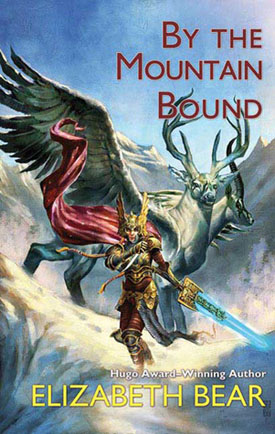 By the Mountain Bound is a prequel to All the Windwracked Stars, and takes quite a different cast. It is a pure fantasy, with none of the science-fiction aspects of the latter book, and leads one to think about possibilities such as “What if Euripides had been a Norse skald?”
By the Mountain Bound is a prequel to All the Windwracked Stars, and takes quite a different cast. It is a pure fantasy, with none of the science-fiction aspects of the latter book, and leads one to think about possibilities such as “What if Euripides had been a Norse skald?”
It has been nearly five hundred years since the Children of Light called the world out of the sea from which they also rose. They live in the northern reaches of Valdyrgard, leaving the mortals pretty much to their own business, except to act sometimes as teachers or guides, and live the life that is theirs: feasting, lore, and tests of prowess at arms. Strifbjorn is their recognized war chief — they are all, einherjar and waelcyrge alike, warriors. Not all, however, were new-born from the sea: Mingan, the Grey Wolf, who ate the sun at the end of the last world, his sister the Imogen, a black-furred and feathered hunger, and his brother the Serpent, the great Wyrm that lies at the bottom of the sea and is the closest thing the Children have to a god, survived the death of Midgard. The Children’s lives go on without incident until Strifbjorn discovers a woman drowned on the beach — drowned, but not yet dead. Rescued and finally recovered, she gives her name at Heythe and warns of an army of giants in pursuit, bent on the destruction of the Children.
I mentioned Euripides, and with good reason. The people in this story — and they are beyond mere characters — are just as complex and fate-ridden as his protagonists, and the inevitability of events is something seldom seen since the tragedies of the Greeks. It’s a riff on Norse mythology, to be sure, and a cogent and believable one, with all the darkness of the sagas as well as the tragic dimension of the best of the Greek dramatists.
One thing that repeatedly strikes me about Bear’s work is the strength of her prose. I’ve mentioned before that she hits a poetic level rare in fantastic fiction, and in Mountain Bound she’s managed to kick that achievement up a notch: the prose is strong, fluid, the diction inevitably apt, and the resonances are telling: this is prose poetry, elliptical, evocative, loaded with meaning that happens around the words as much as in them. This happens as much in the narration by Mingan and Muire as in the third-person sections. Point of view moves from Mingan to Muire to a narrator observing Strifbjorn, weaving back and forth to build a rich picture. The images are vivid, not only in Bear’s mercifully concise descriptions of the milieu, but in the revelations of relationships. Strifbjorn, a chieftain, a renowned warrior, a great big hunk of a man, and unmarried, is the object of fond hopes from a number of quarters, not the least of which is Muire, small, perceptive, more a scholar than a warrior. Muire herself proves forged of finer metal than most when she discovers just who it is that Strifbjorn loves and decides that she will honor that love and keep her peace — it’s not a love that is readily accepted among the Children, but Muire can’t see that it’s made Strifbjorn any less than he was, and she would be willing to be his wife if not his love, should that ever seem likely.
And Bear’s depiction of the love between Strifbjorn and Mingan is fully in keeping with her merciless examinations of love in previous works and at the same time is so integral to this story that it’s almost impossible to separate it out. She’s used a striking metaphor — they’ve shared their souls, in essence, and each carries a shard of the other near his heart. As dark and hard-edged as Bear tends to be about love — and that is one of her recurring themes — this is a very romantic take, and makes the ultimate resolution of the tale all the more poignant.
Bear has come up with another tough, hard-edged story that goes places very few writers want to go, particularly in the realm of speculative fiction. As much as I want happy endings, I have to accept this one, which is anything but — the logic of the narrative makes it as inescapable as it is inevitable, and Bear is writer enough to hit that catharsis that the Greeks aimed for. This is a brilliant book.
(Tor, 2009)
